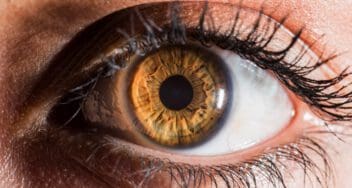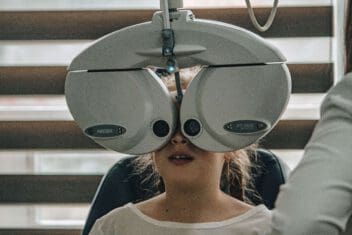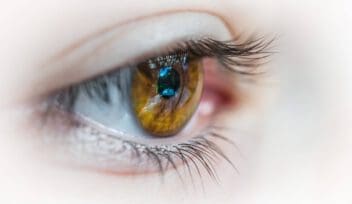
Medically Reviewed by Iga Gray, M.D. NVISION Surgeon
Will I Go Blind From Glaucoma? Glaucoma Progression Timeline & Prevention
Home / Diagnosed With Glaucoma /
Last Updated:

Medically Reviewed by Iga Gray, M.D. NVISION Surgeon

Article At a Glance
Most of the time, glaucoma does not lead to blindness if it is treated. Without treatment, glaucoma will eventually cause blindness. Even with treatment, about 15 percent of the time glaucoma can lead to blindness in at least one eye over a period of 20 years.
Vision loss from glaucoma generally progresses slowly. With proper management and timely treatment, vision loss can be slowed or even halted altogether.
Table of Contents
Vision loss from glaucoma generally progresses slowly. With proper management and timely treatment, vision loss can be slowed or even halted altogether.
Treatments and prevention methods can help you preserve your sight. Most of the time, glaucoma does not lead to blindness.
Glaucoma & Vision Loss

Glaucoma is a group of eye diseases that is caused by damage to the optic nerve related to high intraocular eye pressure (IOP). The American Optometric Association (AOA) publishes that glaucoma is the second leading cause of blindness for Americans.
Glaucoma can affect anyone of any age, but it is most common in people ages 40 and older. For people over age 60, glaucoma is the number one cause of blindness.
You deserve clear vision. We can help.
With 135+ locations and over 2.5 million procedures performed, our board-certified eye surgeons deliver results you can trust.
Your journey to better vision starts here.
The condition is usually the result of pressure in your eye getting too high due to a buildup of fluid, the aqueous humor.
Typically, this fluid is made and replaced on an evenly regulated basis. Sometimes, the drainage angle gets blocked, causing pressure in your eye to build. This can push on the optic nerve at the back of the eye. The optic nerve is what sends information to your brain about what you are seeing.
Your optic nerve is made up of many small nerve fibers, and high fluid pressure can kill them. As the nerve fibers die, your vision can be impaired. Initially, you will likely see blind spots, experience patchy vision, or lose your peripheral (side) vision.
Glaucoma progresses slowly most of the time.
Glaucoma Timeline
If you have glaucoma, treatment is critical to prevent blindness.
Fortunately, glaucoma typically progresses very slowly, over years. The progression of vision loss can be stunted, slowed, or even stopped with treatment.
If the drainage angle in your eye gets blocked, the aqueous humor fluid level rises. This puts pressure on the optic nerve. Over time, this is what causes vision loss and eventual blindness.
Early on, there are very few symptoms of glaucoma. Some peripheral vision loss is most commonly the first physical sign. This is why it is important to undergo regular eye exams to test your IOP and make sure things are within the normal range.
Once you have been diagnosed with glaucoma, vision loss progresses slowly, particularly if you begin treatment in the early stages of the condition. The more advanced the glaucoma is when you start treating it, the more substantial vision loss can be. Rarer forms of glaucoma can also progress more rapidly, such as angle-closure glaucoma.
Risk Factors for Developing Glaucoma

The biggest influencer on the timeline of glaucoma-related vision loss is treatment. If you get regular eye exams, receive treatment early on, and stick to your treatment plan, you can slow or even possibly stop vision loss. In this case, the likelihood of blindness drops significantly.
There are some risk factors that can increase the odds you will develop the condition.
- Age: Glaucoma is most common in Americans over age 60.
- Race: It is more common in African American, Asian, and Hispanic individuals over age 40.
- Family history: Glaucoma has a genetic component.
- Medical/biological conditions: Some medical conditions, like diabetes and high blood pressure, increase the risk for glaucoma. Thin corneas and chronic eye inflammation also increase the risk.
- Trauma: An injury to the eye can increase eye pressure.
- Medications: Prolonged use of corticosteroids increases the likelihood of glaucoma.
Factors That Influence the Glaucoma Progression Timeline
The most common form of glaucoma is open-angle glaucoma, which progresses very slowly and has few early physical symptoms. Other forms of glaucoma, such as angle-closure glaucoma, are less common but can progress faster.
An acute angle-closure glaucoma attack is a medical emergency. It can cause vision loss and blindness quickly if not treated. Symptoms include the following:
- Headache
- Eye pain
- Redness of the eyes
- Blurred vision
- Halos or rainbows around lights
- Blurred vision
- Nausea and vomiting
Seek immediate medical attention if you suffer from an acute angle-closure glaucoma attack.
You deserve clear vision. We can help.
With 135+ locations and over 2.5 million procedures performed, our board-certified eye surgeons deliver results you can trust.
Your journey to better vision starts here.
Glaucoma Treatments

Once you have been diagnosed with glaucoma, you will need to manage the condition in order to keep your IOP down and protect your vision.
Medications, generally in the form of prescription eye drops, are usually the first-line treatment for glaucoma. If you use these medications exactly as prescribed, you can slow and stall glaucoma’s progression.
There are laser and surgical treatments for glaucoma that can be done to drain excess fluid from your eyes and also increase fluid drainage. These procedures range from minimally invasive glaucoma surgery (MIGS) to laser procedures, and surgeries. All of these treatments for glaucoma can slow or stop vision loss related to high IOP.
Vision Loss Prevention
Once vision loss related to optic nerve damage and glaucoma occurs, it can’t be reversed. Further vision loss can be slowed with treatment, however.
In order to prevent glaucoma and vision loss related to glaucoma, there are some things you can do.
- Exercise regularly to promote healthy blood flow.
- Eat a balanced and nutritious diet to optimize your physical health.
- Get regular exams that include dilated pupil eye exams and IOP measurement.
- Take any prescribed medications as directed, and follow your doctor’s treatment instructions exactly.
- Wear eye protection to keep your eyes safe from injury and trauma.
If treated, glaucoma does not lead to blindness the majority of the time. If you take care of your eyes and manage the condition properly, you can often avoid or slow substantial vision loss.
How to Support a Loved One Who Has Gone Blind From Glaucoma
If your loved one has gone blind due to glaucoma, you can support them through this massive life change in a variety of ways.
- Support their eye health. Make sure they see their ophthalmologist regularly to protect their overall eye health. Maintain appointments with other medical professionals as well, such as their general practitioner.
- Build a safer home environment. Install handrails and grab bars throughout the home. Remove tripping hazards, and create clear paths throughout the home.
- Promote independence. Place things in specific spots, and walk them through exactly where they are. This promotes independence as they don’t have to rely on others to find the things they need.
- Encourage conversation. Blindness can be isolating. Encourage your loved one to participate in social activities with you, and let them know you are always there to talk.
Blindness Resources
There are many organizations and foundations that are dedicated to helping people who are dealing with vision loss and blindness. Here are a few:
- American Foundation for the Blind
- National Federation of the Blind
- American Council for the Blind
- BrightFocus Foundation
You deserve clear vision. We can help.
With 135+ locations and over 2.5 million procedures performed, our board-certified eye surgeons deliver results you can trust.
Your journey to better vision starts here.
References
- Glaucoma. (2019). American Optometric Association (AOA).
- What Is Glaucoma? (August 2019). American Academy of Ophthalmology (AAO).
- Why Do People (Still) Go Blind From Glaucoma? (March 2015). Translational Vision Science and Technology.
- Open-Angle Glaucoma: Are There Symptoms. (July 2018). BrightFocus Foundation.
- What Can I Do to Prevent Glaucoma? (October 2017). Glaucoma Research Foundation.

Dr. Iga N. Gray is a comprehensive ophthalmologist with a specialization in glaucoma, currently practicing at Alvarado Eye Associates in San Diego, California. Prior to that, she worked at Philadelphia Eye Associates and was affiliated with Wills Eye Hospital and the University of Pennsylvania’s Scheie Eye Institute, where she completed her glaucoma fellowship and ophthalmology residency.
This content is for informational purposes only. It may have been reviewed by a licensed physician, but is not intended to serve as a substitute for professional medical advice. Always consult your healthcare provider with any health concerns. For more, read our Privacy Policy and Editorial Policy.

